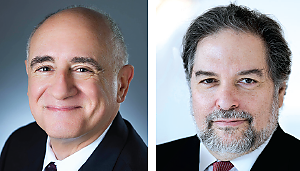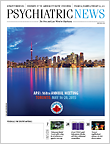APA’s 2015 annual meeting in the cosmopolitan city of Toronto promises to be an unforgettable educational experience. The breadth of the scientific program is impossible to capture in a brief article. The highlights contained here and throughout this issue of Psychiatric News are but a small sample of what you can expect as we bring together some of the best minds in psychiatry to present compelling clinical, research, and practice-related sessions in one dynamic meeting.
The theme of this year’s meeting is “Psychiatry: Integrating Body and Mind, Heart and Soul.” Psychiatry sits at the intersection of the basic and cognitive neurosciences and general medicine. As such, focusing on advances in science and the importance of integrating care is inevitable. When considered from the experience of illness and human development, psychiatry is among the most intimate of fields, and heart and soul take center stage. All these perspectives are well represented in our program.
We are pleased to announce that the Opening Session will feature a conversation with Dr. Summergrad, Helen S. Mayberg, M.D., and the Hon. Patrick Kennedy on neuroscience research, advocacy, and the language of mental health (see facing page). Former Rep. Kennedy will receive APA’s 2015 Patient Advocacy Award during the Convocation of Distinguished Fellows, which will take place on Monday, May 18, at 5:30 p.m. Another special session is a unique video event in which Dr. Summergrad will present highlights of his in-depth interview with Ram Dass on meditation, healing, and aging. This session will be held on Tuesday, May 19, at 11:30 a.m.
At APA annual meetings, one of the NIH mental health institutes typically sponsors a track of sessions in which the latest research is presented in its area of concentration and applications to clinical practice. This year, the track will be sponsored by the National Institute on Alcohol Abuse and Alcoholism (NIAAA). George Koob, Ph.D., director of the NIAAA, will present the first lecture in the track (see page 15). Also presenting are Robert Huebner, Ph.D., on alcohol use and posttraumatic stress disorder; Anita Bechtholt, Ph.D., on alcohol use disorders and adolescents; Raye Litten, Ph.D., on the development of medications to treat alcohol use disorder and co-occurring psychiatric disorders; and Kenneth Warren, Ph.D., on the prevention of fetal alcohol spectrum disorders.
Making the meeting even more timely, Dr. Summergrad has planned a series of presidential symposia to address topics that are particularly relevant. For example, one is “21st-Century Psychiatry at the Interface of Genetics, Neurobiology, and Clinical Science” with Charles Nemeroff, M.D., Ph.D., Daniel Weinberger, M.D., Karl Deisseroth, M.D., Ph.D., and David Rubinow, M.D. Others will examine issues related to geriatric psychiatry, forensic psychiatry, marijuana use, and psychodynamic psychiatry in medical settings. Dr. Deisseroth is also the recipient of this year’s APA Adolf Meyer Award and will present the lecture “Illuminating the Brain” on Monday, May 18, at 11 a.m.
One of the meeting’s most popular formats is the interactive sessions, in which meeting attendees can engage directly with experts. This year’s meeting will have 14 interactive sessions, and among their leaders are Dr. Summergrad, Dr. Mayberg, Dr. Nemeroff, Melissa Arbuckle, M.D., Barbara Coffey, M.D., Glen Gabbard, M.D., Otto Kernberg, M.D., Russell Lim, M.D., John Oldham, M.D., Alan Schatzberg, M.D., Nora Volkow, M.D., and Stuart Yudofsky, M.D. Please check the program book for further information as several of these sessions are for residents only.
The international lectures will showcase psychiatric experts and leaders from around the world, including Sir Simon Wessely, M.D., president of the Royal College of Psychiatrists; Florian Holsboer, M.D., director of the Max Planck Institute of Psychiatry in Munich; Frank Schneider, M.D., who as president of the German Association for Psychiatry and Psychotherapy spearheaded an apology for the behavior of psychiatrists during the Nazi era; and Ashley Bush, M.D., a translational neuroscientist and chief scientific officer of the Cooperative Research Centre for Mental Health at the University of Melbourne.
Award-winning pianist Richard Kogan, M.D., will once again share his musical talents and psychiatric insights about a famous composer. This year’s presentation is “The Mind and Music of Chopin,” which will be held on Saturday, May 16, at 5:30 p.m.
Contributing their special expertise to the scientific and professional base of the meeting are a number of our allied organizations, including the American Psychoanalytic Association, American Academy of Psychoanalysis and Dynamic Psychiatry, Academy of Psychosomatic Medicine, American Academy of Addiction Psychiatry, American Academy of Psychiatry and the Law, American Association of Directors of Psychiatric Residency Training, and American Academy of Child and Adolescent Psychiatry.
These sessions represent just a small part of the rich scientific program planned for this year’s meeting. Regardless of your professional area of interest or career stage, you will find information that will sharpen your clinical skills, update you on the latest research developments that bring the promise of new and more targeted treatments, and inform you about new models of care delivery. APA’s annual meeting has long been known as the premier psychiatric event not only in this country but the world, and we look forward to sharing its excitement with you. ■

